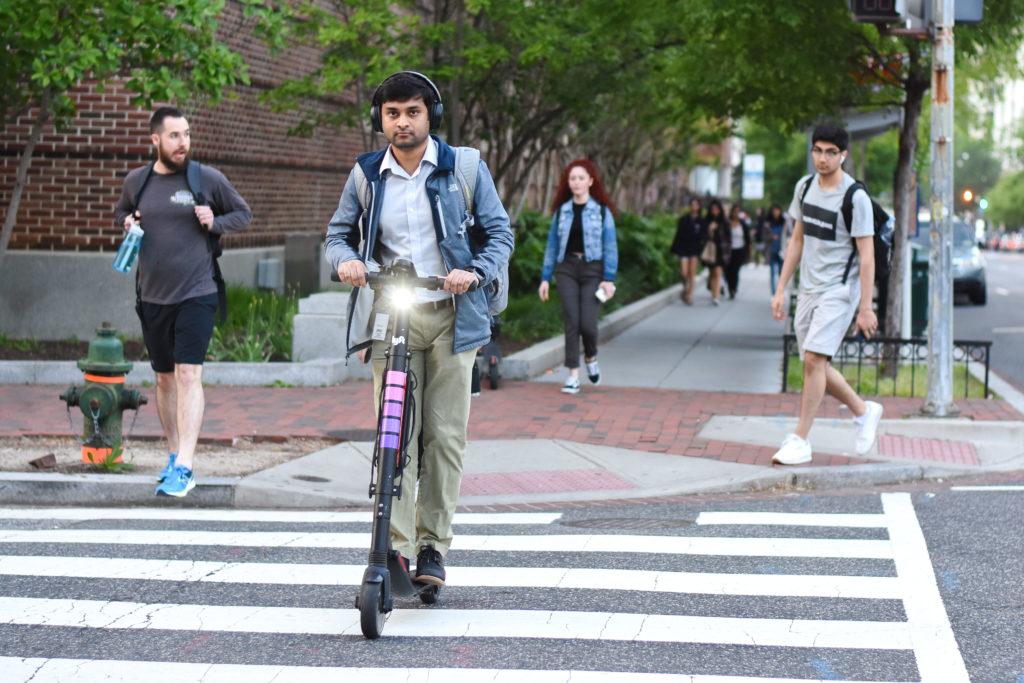A D.C. Councilmember proposed revisions to the 2020 budget earlier this month that would create dedicated street parking for dockless bikes and scooters and reverse Mayor Muriel Bowser’s decision to waive Circulator bus fares.
Councilmember Mary Cheh, who represents Ward 3 and chairs the Committee on Transportation and the Environment, proposed changes to Bowser’s budget for next fiscal year, which will undergo a final vote at the end of the month. Neighborhood leaders said the raised scooter speed limit would discourage users from riding on sidewalks, and the parking spots for dockless vehicles would keep bikes and scooters out of pedestrians’ way.
Cheh did not return requests for comment.
Defunding the Circulator
Cheh’s budget proposal would reverse Bowser’s decision to waive the $1-per-ride Circulator fare. Bowser instated the free fares in February and extended the $3.1 million program indefinitely in March.
The Bowser administration has pushed back against Cheh’s recommendation to defund the Circulator, arguing that Bowser’s decision has reduced the number of drivers in the District and worked toward the District’s Vision Zero goal to eliminate traffic fatalities by 2024.
Junior and Advisory Neighborhood Commissioner James Harnett said he supports keeping Circulator rides free. But he said the District should eliminate extra costs, like transfer fees on the Metrobus and Metrorail, to reduce public transportation prices.
Student leaders have urged officials and the Washington Metropolitan Area Transit Authority to provide students with a University Pass, a discounted Metro pass program WMATA offers for D.C. students. University and WMATA officials said in February that negotiating a deal to provide students with UPass is not realistic because the University would not profit from the pass.
ANC Commissioner Patrick Kennedy said he is concerned about whether Bowser’s decision to make the Circulator free was the “best use” of the approximately $3 million the program costs. Kennedy said one alternative use of the money would have been to invest in bus service improvements, like adding two-way service on the H1 Metrobus line, which runs from Potomac Park to Brookland.
“There have been some increases in ridership, but I think Councilmember Cheh’s concern, as I understand it and I would associate myself with this concern, is we need to be making decisions like that with a much more rigorous analytical eye,” he said.
ANC Commissioner Detrick Campbell said he supports free public transportation but is concerned that the Circulator serves mainly residents in Ward 2, an affluent section of the District. The Circulator does not offer routes in Wards 4, 5 or 7.
“A lot of people think that there are other routes that are deserving, or if you’re going to make the circulator free, you should make it more accessible to the entire city not just parts of it,” Campbell said.
He added that if Bowser defunds the Circulator in the final budget, the money could be allocated to public schools, efforts to increase affordable housing options or government initiatives to lower D.C. crime rates.
Parking spaces for bikes and scooters
Cheh’s proposal allocates $115,000 to a pilot program that would create designated parking spaces for dockless bikes and scooters. The proposal would not require users to utilize the spaces, but the draft revision states that “if such spots are available, personal mobility device users will use them.”
Campbell said he has heard complaints from residents that dockless bike and scooter users often leave their vehicles on the sidewalk and in front of buildings. He said some residents who use wheelchairs have had to call for help to remove a dockless vehicle that has blocked the door to their home.
The District Department of Transportation issued permits to scooter companies at the beginning of the year after its yearlong pilot program ended in January.
Harnett said the parking spaces would allow users to find available dockless vehicles without having to search around the city.
“Being able to keep these vehicles together for users’ sake is a really good idea and for addressing some of the concerns that people have about dockless bikes and scooters taking up sidewalk space I think is also a good idea,” he said.
Increased scooter speeds
Cheh’s proposal would also raise the maximum scooter speed limit from 10 to 15 miles per hour. DDOT lowered the speed limit from 15 to 10 miles per hour when the pilot program ended in January.
Kennedy said increasing scooter speed could deter scooter riders from using the sidewalk and potentially hitting pedestrians, but the decision may be “counterproductive” because riders risk their own safety when using the vehicles in the street.
“We need spaces where bikes and scooters can operate off of the sidewalks where users feel comfortable operating off of the sidewalks, because if people are operating on 15 miles an hour on congested sidewalks, that’s not going to work,” Kennedy said.




